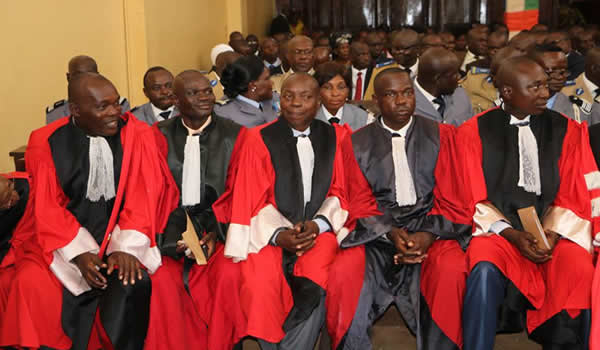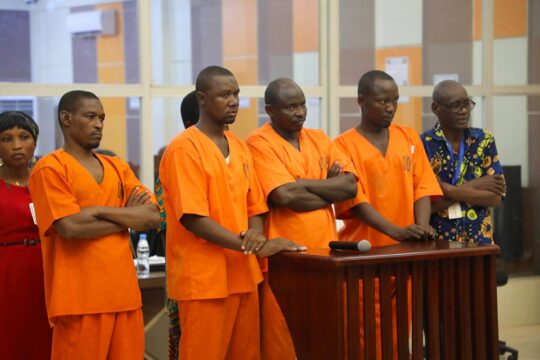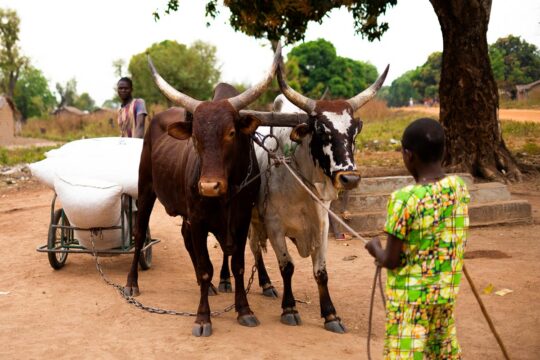The Special Criminal Court (SCC), a hybrid court set up in 2015 as part of the CAR judicial system with UN support, now has staff in place in Bangui and is ready to start work. “The investigations will start officially after the court’s inaugural session, which should take place in October,” Nelly Mandengue of the SCC’s communication department told us.
Preparing a special corps of lawyers
With this in sight, Central African lawyers, who will be required to defend suspects and represent victims, are readying themselves. A special body of lawyers is planned at the SCC. Accused persons and civil parties will be able to benefit from free assistance from a lawyer. “There are some experienced Central African lawyers who are capable of defending the interests of victims and accused,” says lawyer Mathias Barthélémy Morouba, deputy national coordinator of the Central African network of human rights NGOs, while a “capacity strengthening” programme has been set up for others, and foreign lawyers “will be able to intervene in certain cases”.
Lawyers without Borders (ASF) is one of the organizations involved in this programme to support Central African lawyers through training. “The aim is that a victim or a suspect can have a list from which to choose their lawyer,” says Adrien Nifasha, ASF’s Burundian director in the CAR. “We also plan to make available to young Central African lawyers some senior international colleagues, so they can provide pro bono support to them. We want to provide this support at the Special Criminal Court but also, and especially in the national courts. The ultimate objective is to leave a legacy to the national judicial system, because most of the suspects will be tried by normal Central African courts and the SCC can only deal with a limited number of cases.”
Access to evidence and victims
The International Federation for Human Rights (FIDH) has been working with partner organizations in CAR since 2013 to gather evidence on the crimes committed in the country. In 2014, a collective of some 15 Central African lawyers plus African and European jurists affiliated to the FIDH was set up to defend the interests of victims. “It is above all a question of enabling our Central African colleagues to benefit from experience acquired elsewhere in Africa and worldwide on trials of complex and serious crimes,” explains ASF’s Africa director Florent Geel, who nevertheless expects big obstacles for all judicial actors called to play a role before the SCC. “The biggest difficulty, which is not just for the lawyers, is to have proper investigations and evidence, and people to try,” he says. “Access, security and the participation of victims and witnesses are the biggest challenges for civil parties’ lawyers and the associations supporting them. Many victims are displaced, while others are in areas that are isolated and/or controlled by armed groups. They are all living in difficult conditions: poverty, health problems often caused by abuses suffered, and stigmatization, especially for the victims of sexual crimes.” To overcome such obstacles, he says what is needed is “specific tools, solid judicial experience, strong political will on the part of organizations supporting the survivors, and committed political and financial partners.”
National courts set an example
At the SCC, staff are aware of this context of insecurity, instability, fear and uncertainty. “The Court will do its best to fulfil its mandate and bring to justice those suspected of the most serious crimes (war crimes, crimes against humanity, genocide),” says Nelly Mandengue. “But we must not create unrealistic expectations in the sense that unfortunately, given the widespread and numerous nature of the crimes committed in this country, it will be impossible for the Special Court alone to try all the perpetrators.”
The SCC has not yet started a trial, but the ordinary Central African courts are already working. Criminal hearings have restarted across the country, one of which ended on August 31 at the appeals court in Bangui. Another is currently under way since mid-September at the appeals court in Bouar. This is a test that the country’s gradually recovering judicial system is meeting with success, even if independent observers deplore the weakness of some case files, especially those linked to serious crimes. “The resumption of criminal hearings in the CAR is progress and it shows that justice, imperfect but operational, is back,” says Florent Geel. “The enthusiasm generated amongst the people by the criminal hearings shows the needs and expectations of justice in the CAR. It is time for the SCC to act and for its work to be seen to be done in the coming months.”






